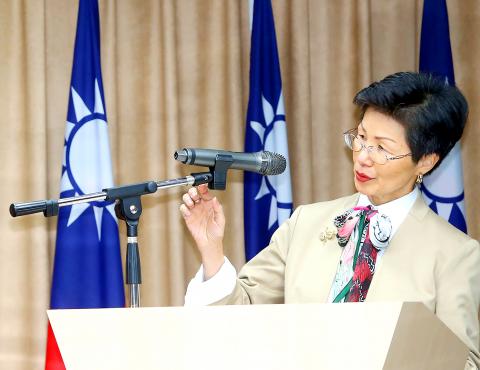Flight safety and national security cannot be compromised, Mainland Affairs Council (MAC) Minister Katharine Chang (張小月) said yesterday, and urged the Chinese government to respect the public opinion in Taiwan and launch negotiations with the government.
Chang made the remarks at the council’s annual year-end news conference in response to China’s unilateral activation of northbound flights on the M503 route earlier this month.
She also presented an annual summary report and explained the council’s goals for this year.

Photo: CNA
The activation of the northbound flights and three extension routes — W121, W122 and W123 — on Jan. 4 affects flight safety and Taiwan’s national security, Chang said.
The Civil Aeronautics Administration’s (CAA) freezing the approval of two Chinese airlines’ application for a total of 176 additional flights during the Lunar New Year holiday is a light response to Beijing’s move and the nation’s high level of constraint has gained public acclaim, she said.
The activation of the route is a cross-strait issue that should go beyond pan-blue and pan-green politics, and the government should not be involved in cross-strait negotiations regarding civil aviation routes, Chang said.
The nation should reach a consensus and refuse to compromise on the issue, she said, adding that the government is urging Beijing to launch negotiations to resolve the conflict as soon as possible.
“The Chinese government has repeatedly said that the activation of the M503 flight route and three extension routes is its internal affair, and has nothing to do with Taiwan’s flight routes and destinations” Chang said. “However, this significantly differs from the reality of cross-strait interactions and we cannot accept this remark.”
Both sides of the Taiwan Strait reached a consensus on the usage of the routes through a civil aviation “mini-cross-strait meeting” in March 2015, so the government is insisting on and executing the policy that was enforced by the former administration, she said, adding that the conflict should technically be negotiated in another meeting, not through politics.
Whether the issue could be resolved in a satisfactory manner would a test to see if the Chinese government respects public opinion in Taiwan, and an important indicator for Taiwanese to estimate the development of cross-strait relations, so Beijing should not underestimate its meaning, Chang said.
Asked about the Chinese government’s suppression of Taiwan in the international community while offering incentives to Taiwanese, she said more challenges in cross-strait relations are expected this year as Beijing continues to neglect official negotiations while increasing civilian interactions.
However, there is a political aim behind China’s offering of incentives to Taiwanese, so the government would review and amend regulations to deal with the situation, Chang added.

Trips for more than 100,000 international and domestic air travelers could be disrupted as China launches a military exercise around Taiwan today, Taiwan’s Civil Aviation Administration (CAA) said yesterday. The exercise could affect nearly 900 flights scheduled to enter the Taipei Flight Information Region (FIR) during the exercise window, it added. A notice issued by the Chinese Civil Aviation Administration showed there would be seven temporary zones around the Taiwan Strait which would be used for live-fire exercises, lasting from 8am to 6pm today. All aircraft are prohibited from entering during exercise, it says. Taipei FIR has 14 international air routes and

The Ministry of National Defense (MND) today released images of the military tracking China’s People's Liberation Army (PLA) movements during the latest round of Chinese drills around Taiwan. The PLA began "Justice Mission 2025" drills today, carrying out live-fire drills, simulated strikes on land and maritime targets, and exercises to blockade the nation's main ports. The exercises are to continue tomorrow, with the PLA announcing sea and air space restrictions for five zones around Taiwan for 10 hours starting from 8:30am. The ministry today released images showing a Chinese J-16 fighter jet tracked by a F-16V Block 20 jet and the

Snow fell on Yushan (Jade Mountain, 玉山) yesterday morning as a continental cold air mass sent temperatures below freezing on Taiwan’s tallest peak, the Central Weather Administration (CWA) said. Snowflakes were seen on Yushan’s north peak from 6:28am to 6:38am, but they did not fully cover the ground and no accumulation was recorded, the CWA said. As of 7:42am, the lowest temperature recorded across Taiwan was minus-5.5°C at Yushan’s Fengkou observatory and minus-4.7°C at the Yushan observatory, CWA data showed. On Hehuanshan (合歡山) in Nantou County, a low of 1.3°C was recorded at 6:39pm, when ice pellets fell at Songsyue Lodge (松雪樓), a

City buses in Taipei and New Taipei City, as well as the Taipei MRT, would on Saturday begin accepting QR code payments from five electronic payment providers, the Taipei Department of Transportation said yesterday. The new option would allow passengers to use the “transportation QR code” feature from EasyWallet, iPass Money, iCash Pay, Jkopay or PXPay Plus. Passengers should open their preferred electronic payment app, select the “transportation code” — not the regular payment code — unlock it, and scan the code at ticket readers or gates, General Planning Division Director-General Liu Kuo-chu (劉國著) said. People should move through the